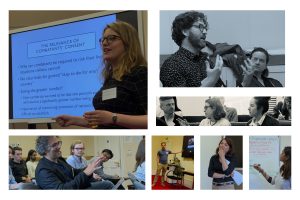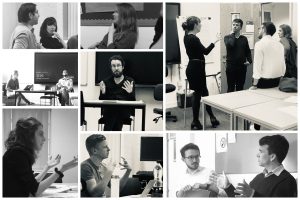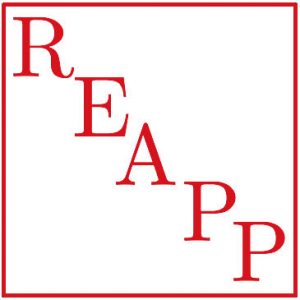Reading Ethics and Political Philosophy (REAPP)
REAPP brings together Reading’s moral and political philosophers, primarily working in the Departments of Philosophy and Politics and International Relations. Sharing a commitment to the methods of analytical philosophy, REAPP’s members work across a range of issues in moral and political philosophy. However, we have particular overlapping interests in the following themes:
- fairness
- politics and violence
- intergenerational justice
- ethics and uncertainty
REAPP acts as a hub for individual scholars to exchange ideas, develop projects, and organise conferences, events, and workshops.
REAPP Activities and Events
Discover events, informative workshops and conferences organised by the Reading Ethics and Political Philosophy research centre.
Past Events
REAPP Graduate/Early Careers Conference 2019
Monday, June 10th & Tuesday June 11th 2019, Whiteknights Campus, University of Reading

The third annual graduate and early careers conference of the Reading Ethics and Political Philosophy (REAPP) network, was held at the University of Reading on the 10th and 11th of June 2019. Keynote presentations were given by Emily McTernan (University College London), Victor Tadros (University of Warwick) and Jeff McMahan (University of Oxford).
Read More about the 2019 REAPP Conference
New Directions in Legitimacy
Monday, November 5th 2018, London Road Campus, University of Reading

The workshop sought to probe legitimacy’s role in politics by considering how we might judge the legitimacy of various political actors, institutions and decisions. In particular, it focused on the question of how claims to political legitimacy can be vindicated when many political institutions which claim it for themselves or their decisions are often unsatisfactory in very many ways. That issue has not always been particularly important to work in contemporary political theory and philosophy on legitimacy, yet is central in the world we actually inhabit. Regimes in our non-ideal world fail to meet standards of social justice, democratic representation and accountability, administrative competence, efficiency, stability, sustainability and respect for sometimes even the most basic human rights. What impact do these political failings have? Is legitimacy a more minimal virtue than that of social or democratic justice, for example, and if so how much more minimal? Are judgments of legitimacy necessarily binary, or should we allow for a wider range of stances towards a supposed authority seeking to impose its will on groups and individuals which are rightly sceptical of it?
Speakers:
- Chris Bennett, University of Sheffield
- Candice Delmas, Northeastern University
- Thomas Fossen, Leiden University
- Robert Jubb, University of Reading
- Andrei Poama, Leiden University
New Directions in Realist Political Theory
Tuesday, June 26th 2018, Whiteknights Campus, University of Reading

In the last decade or so, debates in political theory and philosophy have become increasingly methodological. One way in which this has been true is the increasing prominence of the “realist” critique of the supposed moralism of most contemporary political theory and philosophy. Realists allege that treating politics as an arena for the application of independently-determined moral principles fails to capture its distinctive character. Politics is, they claim, in part constituted by moral disagreement and failure, and so it is a mistake to expect that our shared lives can be oriented around moral consensus and compliance. Disputes about the content, power and accuracy of this critique may well never be fully resolved, given that they seem to in part reflect basic disagreements about not just criteria for successful political theory or philosophy but about a broad range of philosophical questions. This workshop tried to sidestep purely methodological issues.
Realists urge that political theory and philosophy should start from and be sensitive to the context of politics, both as a generic sphere of activity and as a historically-determined outcome of the interactions of various specific agents, practices and institutions in a particular set of circumstances. In the end, the power of the realist critique will be most convincingly demonstrated by showing that work in political theory and philosophy which tries to abide by these prescriptions captures something otherwise missed. By considering issues of disobedience, feasibility, judgment, sovereignty and truth from a realist perspective, the participants in this workshop aimed at providing that demonstration.
Participants and Provisional Paper Titles:
- Enzo Rossi: Political Naturalism: Coercion without Sovereignty
- Greta Favara: Realist Political Theory and the Feasibility Issue
- Gulsen Seven: Political Judgment
- Matt Sleat: Post-Truth and Politics
- Robert Jubb: Realism and Disobedience
REAPP Graduate/Early Careers Conference 2018
The second annual graduate and early careers conference of the Reading Ethics and Political Philosophy (REAPP) network, was held at the University of Reading on the 11th and 12th of June 2018. Keynote presentations were given by Laura Valentini (London School of Economics and Political Science), David Owen (University of Southampton) and Brad Hooker (University of Reading).
REAPP Graduate/Early Careers Conference 2017
The first annual REAPP conference was held at the University of Reading on 12-13th June 2017. The organisers received over 100 abstracts, which enabled them to put together a varied programme of excellent presentations, with speakers attending from universities all over the world. Keynote presentations were given by Sarah Fine (Kings College London), Zofia Stemplowska (University of Oxford) and Fiona Woollard (University of Southampton).
Read what our Conference participants had to say
Theorising Resistance
Thursday, June 9th & Friday June 10th 2016, Whiteknights Campus, University of Reading
Much contemporary normative political theory and philosophy is abstract and idealised. As various critics have rightly observed, this often leads to it ignoring various salient facts, particularly facts about the ways in which political institutions perpetuate themselves over time. Many self-styled realists have attempted to correct this oversight by emphasising the importance of the goods of political order. However, they also obscured questions about resistance to that imposition and its various consequences.
Yet protest and revolutionary activity are central topics for political theory and philosophy. How should they be understood and assessed? Can they be properly grasped using the tools with which analytically-trained theorists and philosophers are familiar? Can a focus on the distinctive goods of politics typical of realists capture what is significant about attempting to disrupt their provision? Is a more historical or critical perspective more appropriate?
Bringing together scholars from a variety of approaches, this workshop combined methodological and first-order theorising to attempt to illuminate questions about political resistance and its assessment.
Speakers:
- Dr Lorna Finlayson, University of Essex
- Dr Rob Jubb, University of Reading
- Professor John McCormick, University of Chicago
- Dr Emily McTernan, University College London
- Dr Avia Pasternak, University College London
- Dr Enzo Rossi, Universiteit van Amsterdam
FACULTY MEMBERS AND CO-DIRECTORS
- Dr Robert Jubb – (Co-director, Politics)
- Dr Luke Elson – (Co-director, Philosophy)
- Professor Alan Cromartie – (Politics)
- Dr Brian Feltham – (Politics)
- Professor Brad Hooker – (Philosophy)
- Dr Dimitrios Kyritsis – (Law)
- Dr Charlotte Newey – (Philosophy)
- Professor Philip Stratton-Lake – (Philosophy)
- Dr Alice Baderin – (Politics)
We actively encourage postgraduate students to get involved with REAPP. REAPP Postgraduates have their own regular reading group, and are able to organise events with REAPP’s backing.
